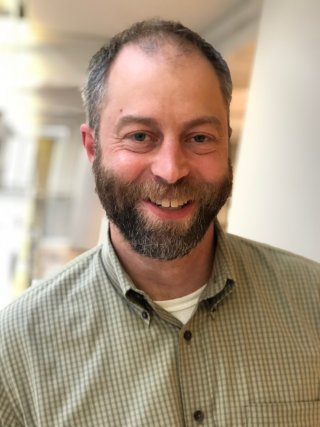Meet EPA Researcher Stephen LeDuc Ph.D.

EPA researcher Steve LeDuc focuses on health and environmental quality, especially the impacts of wildfire on communities and ecosystems.
Within EPA, he and a team of researchers study the mobilization of chemicals by fire, and the effects on air quality, water quality, and ecosystems. Dr. LeDuc and other researchers reported increased heavy metals and other hazardous air pollutants in air samples downwind of fires burning through urban areas. Likewise, they have also shown that chemical nutrients in smoke are associated with increased harmful algal blooms in downwind lakes and reservoirs in the continental United States. These algal blooms can cause drinking water contamination, while also impacting recreation (e.g., fishing, boating) and aquatic life. This information helps managers and communities be better prepared for the impacts of fire, and more quickly and safely recover after fire. When not working, he loves to spend time in the outdoors with his family, and if not doing that, reading history or fiction, and watching sports (but not all at the same time).
Tell us about your background.
I have a dual Ph.D. in forestry and ecology from Michigan State University, a master’s in geography from Penn State, and a bachelor’s in natural resources from the University of Michigan. So, I’m a product of the Big Ten, making for some confusing football allegiances at times.
When did you first know you wanted to work in environmental science?
My dad took us on epic van trips out West growing up, visiting many national parks. When we did not go out west, we would visit my extended family in West Virginia, where we would play in the woods for hours. I think it was these early experiences that sparked my interest in the outdoors and eventually environmental science.
What do you like most about your job?
I’m incredibly honored to work for EPA and the U.S. public. I get to work on some of the most relevant science questions of the day, and I’m never bored doing it.
How does your science matter?
EPA science matters tremendously. States, Tribes, other partners, and the public rely on information from EPA scientists to help keep their communities safe and healthy. In a webinar on wildfire in 2024, we had over 1,100 attendees, many of whom were from communities and areas profoundly impacted by fire and smoke. Communicating how to stay safe during a fire, and recover from it is central to what we do at EPA. Through these interactions, I’m repeatedly reminded, almost on a daily basis, of the importance of EPA’s scientific mission, providing information to the communities and partners we serve.
If you weren’t a scientist, what would you be doing?
Probably a park ranger. I love the idea of being a steward for a particular place, getting to know an area of land and helping people appreciate it too. If not that, then a play-by-play baseball broadcaster for radio (not TV).
What advice would you give a student interested in a career in science?
My advice would be two-fold. One, I always had trouble choosing a career path since I was interested in absolutely everything. For example, I was always interested in history in addition to science. My advice would be to eventually pick a career door to walk through and don’t look back, but you can always supplement with other things beyond science. Indeed, focusing on science all the time can be problematic. It actually makes for a better, more well-rounded scientist to know a little something about many other subjects. Second, don’t worry so much about yourself. Focus outwardly instead, serving the larger community with your science, and the rest will take care of itself. Not only will you do better work, but it is incredibly freeing mentally.
If you can have any superpower, what would you choose?
Teleportation. The downside of pursuing a career in science is that it often has taken me away from my family and friends. I’d like to spend time with them whenever I wanted to.
What do you think the coolest scientific discovery was and why?
Germ theory and antibiotics. I would not even be here answering these questions without those two discoveries.
If you could have dinner with any scientist, past or present, who would you choose and what would you talk about?
Does it have to be a scientist? I’ve always wanted to meet Abraham Lincoln. If a scientist, then Aldo Leopold. He was an amazing observer of nature, finding wonder everywhere by just slowing down and looking.
Editor's Note: The opinions expressed herein are those of the researcher alone. EPA does not endorse the opinions or positions expressed.
